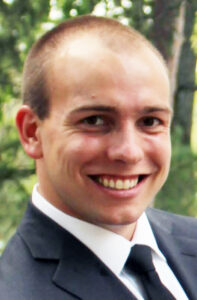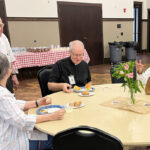By Patrick Schmadeke
We are formed by the people around us. This was illustrated to me in a recent conversation with our 2.5-year-old son. We were reviewing the activities of the day when he intuitively slipped into using the past tense. We hadn’t intentionally taught him this skill. That’s just the point. He was picking this up through observation.

Like sponges dropped into water, we absorb what is around us. This is great for language development, acquiring new skills and growing in community life. Yet, we are not necessarily impervious to acquiring bad habits, nor are we immune to inadvertently perpetuating inherited social ills. Lacking vigilance, we can err in at least two directions: intransigent zealousness or docile complacency. The first looks like being swept up in vain excitement. The latter looks something more like sleepwalking. Both are the result of uncritical internalization of the influences around us.
Such influences come from every area of life: economic, religious, political, governmental, the arts, and the list goes on. Consider just one example from the corporate world in the form of advertising and marketing. In 2018, more than 20 percent of retail industry spending was on advertising; $23.5 billion was spent on digital ads alone. In 2019, this number is expected to grow to $27.6 billion. These investments produce enormous returns for large corporations. Some 35 percent of purchases on Amazon and 75 percent of views on Netflix are the result of online recommendations curated for individual consumers (McKinsey & Company). It is not difficult to imagine the vast and invasive influence being exercised.
In a world of influences vying for our attention (votes, money, time), how are we to discern our priorities? How are we to create communities which nurture human flourishing? How can we create environments which respond well to influences that erode what matters most? The most succinct response was given by Christ: love one another.
We don’t do this well when we start pointing fingers. To merely blame retailers for trying to influence how I spend money is at best insincere — their strategies respond to how we make actual spending decisions. To merely blame countries or international corporations for human rights violations is only part of the picture — they produce products that people willingly purchase despite the human rights violations.
To merely blame politicians for creating a divisive political culture is insufficient — we must examine our own rhetoric. To distance oneself from the problem instead of actively seeking solutions is to abdicate the moral responsibility we have to our communities. We are enmeshed in the decay that surrounds us. And so we must attend to Christ’s response: love one another.
We don’t do this well when we attempt to exclude what might be new and difficult in order to preserve a univocal image of what we have always known and experienced. Diversity is written into the seamless garment of creation. We degrade this tapestry when we pollute the earth, reject the refugee and shun those with whom we disagree. We must constantly train ourselves to see God where we did not expect to do so. God’s radiant goodness meets the horizons of our limited selves in unexpected forms and begs more of us: love one another.
We do this well when we invest in relationships. This is modeled for us in the primordial sacrament of the Trinity. We participate in the exchange of God’s self in occasions of mutual affection, living in harmony with creation and, perhaps most richly, when we are in kinship with those whom society judges to be least “useful.”
We know the world is marked by sin. Simultaneously, we want to belong to and create communities of virtue. If we have lost sight of what flourishing community life looks like, then we need to practice the command of Christ until it echoes in our hearts like the beat of a drum: love one another. It would be untrue to suggest that this isn’t a lifelong process. It would equally untrue to suggest that it is anything short of experiencing the beatific vision. Christ’s love is the best kind of “tense” we can pick up on, and we ought to be intentional about creating it.
(Editor’s note: Patrick Schmadeke is a graduate of St. Ambrose University (‘13) and a student in the Master of Divinity program at the University of Notre Dame. His column offers reflections on his coursework, engaging with the richness of the Catholic Tradition and its relevance to the world today.)











